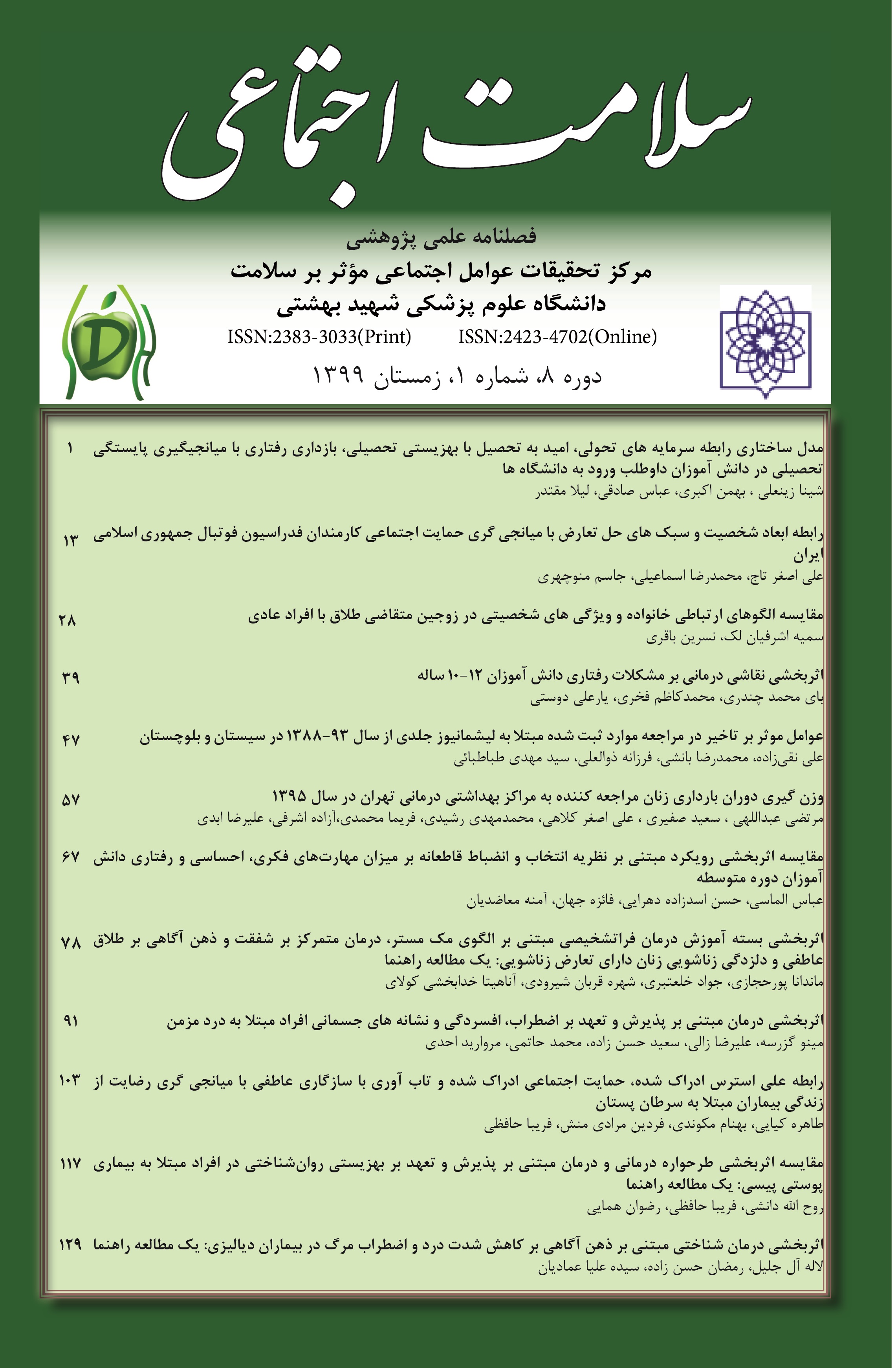اثربخشی آموزش هوش هیجانی بر خودکارآمدی و فرسودگی تحصیلی دانش آموزان دختر پایه سوم مقطع متوسطه اول شهر تنکابن
سلامت اجتماعی,
دوره 7 شماره 2,
22 خرداد 2020
,
صفحه 183-190
https://doi.org/10.22037/ch.v7i2.25257
چکیده
زمینه و هدف: آموزش هوش هیجانی با بالا بردن شناخت فرد از خودش و دیگران، به ارتباط با دیگران و سازگاری و انطباق با محیط پیرامون که برای موفق شدن در بر آوردن خواسته های اجتماعی لازم است منجر می گردد. پژوهش حاضر با هدف تعیین اثربخشی آموزش هوش هیجانی بر خودکارآمدی و فرسودگی تحصیلی دانش آموزان دختر پایه سوم مقطع متوسطه اول شهر تنکابن صورت گرفته است.
روش و مواد: روش این پژوهش، نیمه تجربی و از نوع طرح پیش آزمون و پس آزمون با گروه گواه بود. جامعه آماری پژوهش حاضر شامل کلیه دختران پایه سوم مقطع متوسطه اول شهر تنکابن در سال تحصیلی 97-1396 بود که با روش تصادفی
خوشه ای انتخاب شدند و از بین آنها 60 نفر به طور تصادفی ساده انتخاب و به دو گروه آزمایش و گواه تقسیم شدند و آموزش هوش هیجانی برای گروه آزمایش اجرا شد. آزمودنی ها به پرسشنامه های خودکارآمدی عمومی (GSES) و فرسودگی تحصیلی پاسخ دادند. داده ها با استفاده از تحلیل کواریانس تک متغیره و با کمک نرم افزار SPSS-22 تجزیه و تحلیل شد.
یافته ها: میانگین (انحراف معیار) سن دانش آموزان گروه آزمایش (8/2) 7/15 و گروه گواه (4/2) 2/15 بود. نتایج پژوهش نشان داد که میانگین (انحراف معیار) خودکارآمدی در گروه آزمایش در پیش آزمون از (9/5) 5/30 به (5/5) 4/35 در پس آزمون افزایش یافت (001/0>P)، ولی در گروه گواه به ترتیب از (3/5) 7/30 به (9/5) 5/31 تغییر یافت که معنی دار نبود. میانگین فرسودگی تحصیلی در گروه آزمایش در پیش آزمون از (7/3) 8/40 به (4/3) 1/29 در پس آزمون کاهش یافت (001/0>P)، ولی در گروه گواه به ترتیب از (8/3) 6/40 به (8/3) 84/39 تغییر یافت که معنی دار نبود.
نتیجه گیری: مطالعه نشان داد که آموزش هوش هیجانی، باعث افزایش خودکارآمدی دانش آموزان دختر و کاهش فرسودگی تحصیلی آنها می شود.
- هوش هیجانی، خودکارآمدی، فرسودگی، دانش آموزان
ارجاع به مقاله
مراجع
Wang MT, Holcombe R. Adolescents’ perceptions of school environment, engagement, and academic achievement in middle school. American Educational Research Journal. 2010;47(3):633-62.
Caprara GV, Vecchione M, Alessandri G, Gerbino M, Barbaranelli C. The contribution of personality traits and self‐efficacy beliefs to academic achievement: A longitudinal study. British Journal of Educational Psychology. 2011;81(1):78-96.
Komarraju M, Nadler D. Self-efficacy and academic achievement: Why do implicit beliefs, goals, and effort regulation matter? Learning and Individual Differences. 2013 Jun 1;25:67-72.
Lin SH, Huang YC. Life stress and academic burnout. Active Learning in Higher Education. 2014;15(1):77-90.
Por J, Barriball L, Fitzpatrick J, Roberts J. Emotional intelligence: Its relationship to stress, coping, well-being and professional performance in nursing students. Nurse education today. 2011;31(8):855-60.
Kong F, Zhao J, You X. Emotional intelligence and life satisfaction in Chinese university students: The mediating role of self-esteem and social support. Personality and Individual Differences. 2012;53(8):1039-43.
Salami SO. Emotional intelligence, self-efficacy, psychological well-being and students attitudes: Implications for quality education. European Journal of Educational Studies. 2010;2(3):247-57.
Jamali M, Noroozi A, Tahmasebi R. Factors Affecting Academic Self-Efficacy and Its Association with Academic Achievment among Students of Bushehr University Medical Sciences 2012-13. Iranian Journal of
Medical Education. 2013;13(8):629-41. [Full Text in Persian]
Scherer R. Further evidence on the structural relationship between academic self-concept and self-efficacy: On the effects of domain specificity. Learning and Individual Differences. 2013;28:9-19.
Dehghani M, Pakmehr H, Malekzadeh A. Relationship between Students’ critical thinking and self-efficacy beliefs in Ferdowsi University of Mashhad, Iran. Procedia-Social and Behavioral Sciences. 2011;15:2952-5.
Aypay A. Elementary School Student Burnout Scale for Grades 6-8: A Study of Validity and Reliability. Educational Sciences: Theory and Practice. 2011;11(2):520-27.
Charkhabi M, Abarghuei MA, Hayati D. The association of academic burnout with self-efficacy and quality of learning experience among Iranian students. Springerplus. 2013;2(1):677.
Foruhar A, Eslami M, Sadeghi M. Effect of Learning the Emotional Intelligence Parameters on Increasing the Self-Efficiency and Decreasing the Career Stress. Horizon Med Sci . 2015; 20 (4) :257-61. [Full Text in Persian]
Pool LD, Qualter P. Improving emotional intelligence and emotional self-efficacy through a teaching intervention for university students. Learning and Individual Differences. 2012;22(3):306-12.
Kirk BA, Schutte NS, Hine DW. The effect of an expressive‐writing intervention for employees on emotional self‐efficacy, emotional intelligence, affect, and workplace incivility. Journal of Applied Social Psychology. 2011 Jan 1;41(1):179-95.
Sadoughi M, Tamannaeifar M, Naseri J. The Relationship between Resilience, Hope, Emotional Intelligence and Academic Burnout among Iranian University Students. Studies in Learning & Instruction. 2017; 9(1):50-67. [Full Text in Persian]
Yazici H, Seyis S, Altun F. Emotional intelligence and self-efficacy beliefs as predictors of academic achievement among high school students. Procedia-Social and Behavioral Sciences. 2011;15:2319-23.
Gupta G, Kumar S. Mental health in relation to emotional intelligence and self efficacy among college students. Journal of the Indian Academy of Applied Psychology. 2010;36(1):61-7.
Tsai MT, Tsai CL, Wang YC. A study on the relationship between leadership style, emotional intelligence, self-efficacy and organizational commitment: A case study of the Banking Industry in Taiwan. African Journal of Business Management. 2011;5(13):5319-29.
Kokkinos CM, Kipritsi E. The relationship between bullying, victimization, trait emotional intelligence, self-efficacy and empathy among preadolescents. Social psychology of education. 2012;15(1):41-58.
- چکیده مشاهده شده: 296 بار
- PDF دانلود شده: 142 بار
